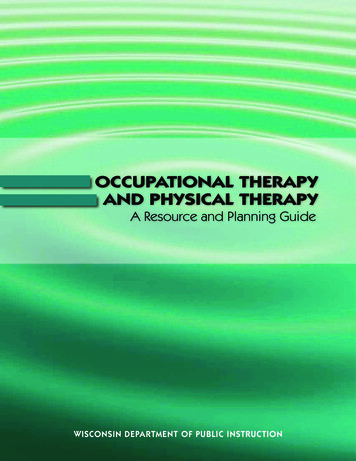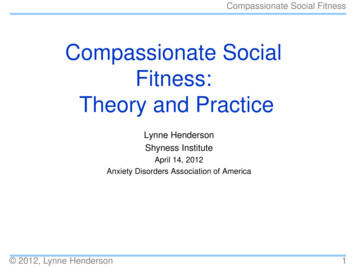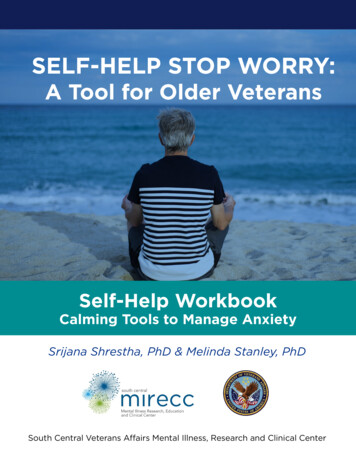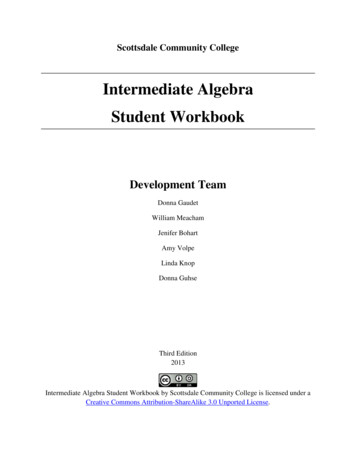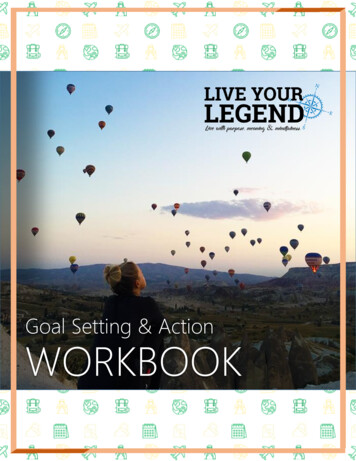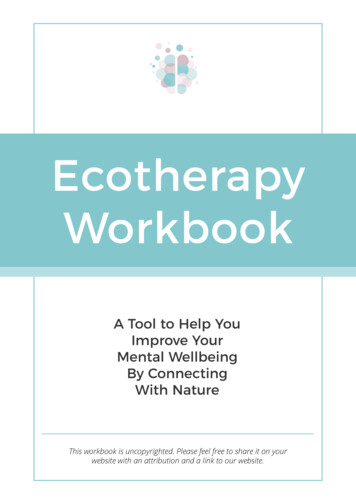
Transcription
EcotherapyWorkbookA Tool to Help YouImprove YourMental WellbeingBy ConnectingWith NatureThis workbook is uncopyrighted. Please feel free to share it on yourwebsite with an attribution and a link to our website.
“A human being is a part of thewhole called by us universe, apart limited in time and space.He experiences himself, histhoughts and feelings assomething separated fromthe rest, a kind of opticaldelusion of his consciousness.This delusion is a kind of prisonfor us, restricting us to ourpersonal desires and to affectionfor a few persons nearest to us.Our task must be to free ourselvesfrom this prison by widening ourcircle of compassion to embraceall living creatures and the wholeof nature in its beauty.”- Albert EinsteinPAGE 2ECOTHERAPY WORKBOOK PERMISSION TO USE FOR THERAPY AND COACHING PURPOSES
IntroductionThe UK’s 2021 theme for Mental Health Awareness Week is nature.Research in the relatively new field of ecotherapy suggests there’s a strong link between timespent in nature and mental wellbeing.The reasons behind this are complex and still being understood, but here are some ideas whynature is so good for us: It encourages mindfulness. Focusing on the soothing sights and sounds of naturepromotes mindfulness – the ability to be fully aware in the present moment.It reduces excessive self-focus and rumination. Rumination is the tendency to fixateon distressing mental activity – the upsetting thoughts, memories and images our mindoften conjures up. Nature steers us away from this unhelpful habit by directing our attentionexternally, making us less self-focused. This is important because excessive self-focus iswidely considered to be a root cause of poor mental wellbeing. In one study, researcherscompared the brain activity of people who walked in nature as opposed to an urban setting.They found that those who walked in nature had less activity in their prefrontal cortex, abrain region associated with rumination.It boosts positive emotions. Nature helps us relieve negative moods and boost positiveemotions such as awe, joy and peacefulness. In a 2020 study, a group of participants wenton 15-minute Awe Walks every week for eight weeks. Compared to those who took normalwalks, the awe walkers experienced more positive emotions and less distress in daily life.Another idea is the biophilia hypothesis, which claims we have an innate drive to connect withnature – it’s a preference coded into our DNA because it helped our ancient ancestors survive.Research suggests spending two hours a week in nature is enough to significantly improveyour mental wellbeing. This workbook is therefore designed to help you create this habit.Read our inspiration list and use the Weekly Nature Journal to plan your weekly dose, perhapsreviewing it every Sunday. While reading, be sure to tick the ideas you’re interested in, and addany ideas of your own.1. Go for an Awe Walk Visit a local or national park and focus your attention on what you can see, hear and smell.Practice what’s called ‘beginner’s mind’ in Buddhism: seeing things as though you’re looking atthem for the first time. It’s easy to spend most of our lives walking around on autopilot. Makingan effort to truly notice the details of what’s around you can help spark those feelings of awe.Useful Links Check out this collection of the 100 best walking routes in Britain created from a survey ofthousands of regular walkers.Search for a local forest to walk in.Join Ramblers, the UK’s largest walking group.Discover a local nature reserve to visit.Find a botanic garden to browse.Book a walking holiday.PAGE 1ECOTHERAPY WORKBOOK PERMISSION TO USE FOR THERAPY AND COACHING PURPOSES
2. Take an Animal for a Nature Walk Research shows that spending time with dogs can reduce stress and anxiety, ease loneliness, andencourage playfulness.Offer to walk the dog of someone you know or join the Borrow My Doggy website.3. Go Camping Use this website to find a campsite.New to camping? Check out this Camping 101 YouTube video full of helpful tips.4. Enjoy a Countryside Break Browse Airbnb for a countryside getaway.Find inspiration for places to go on the Visit England website.5. Hunt for Free Food Like the sound of free food?Then you might enjoy foraging!Foraging refers to searching for food in the natural environment. Also known as “hunting andgathering”, it’s what our ancestors did for millions of years.Common foraged foods nowadays include wild garlic (for homemade pesto), blackberry (fordelicious desserts) and elderflower (for homemade cordial).The Woodland Trust have a fantastic online guide.We also recommend the book Food for Free.Want more free tips? Head to the foraging subreddit online community.6. Try Out Nature Photography Interested in a new hobby? Why notgive landscape and/or wildlifephotography a go?Udemy Online Courses Landscape photographyWildlife photographyYouTube Videos Landscape photographyWildlife photographyTHE WELLNESS SOCIETY FIND MORE TOOLS AT THEWELLNESSSOCIETY.ORGPAGE 2
7. Spy on Birds Another hobby you might be interested in is bird watching, or birding.Collins Bird Guide is the “ultimate reference book for bird enthusiasts”.Prefer an app? Here’s the digital tool for Apple and Android.Here’s an online community where you can find other birding enthusiasts.8. Start a Nature Scrapbook Collect plants and flowers to keep pressedinside your scrapbook.Make notes about your awe walks, treatingit as a type of journal.Invest in a polaroid camera and feature yournature photography inside.Browse Pinterest for more scrapbooking ideas.9. Get Creative with Arts and Crafts Interested in developing your artistic skills?There’s plenty of free, high-quality videos on YouTube teaching you how to draw nature.For example, check out the tutorials on how to draw a tree.Why not take a sketchpad with you to the park?Pinterest is also jam-packed with inspiration for nature-themed craft activities for kids: DIY Bird FeederStick CraftsButterfly Nature Craft10. Go Geocaching Got kids? Here’s another idea for you.Geocaching is an outdoor treasure-hunting game - your phone’s GPS helps you find the treasure.Find out more in this video.A similar game is Pokémon Go - watch the trailer video here.11. Join an Ecotherapy Programme In 2008, the mental health charity Mind received funding from The Big Lottery to set up 130ecotherapy projects.PAGE 3ECOTHERAPY WORKBOOK PERMISSION TO USE FOR THERAPY AND COACHING PURPOSES
They now facilitate lots of different nature-based activities, for example: Adventure therapy involves doing adventurous physical activities in a group, such as rafting,rock climbing or caving.Animal assisted interventions involve being in spaces such as farms where you comeinto contact with animals and spend time feeding or petting them.Green exercise therapy involves doing exercise in green spaces, for example walking,running or cycling.Nature arts and crafts includes creating art in green space, using the environment asinspiration or using natural materials such as wood, grass or clay.For more information, visit their website.12. Become a Volunteer In a study of volunteers at The Wildlife Trust, 95% of people who were experiencing poor mentalwellbeing at the start of their volunteering project said they felt better in 6 weeks.Search The Wildlife Trust’s volunteering opportunities here.Find More Volunteering Opportunities Volunteer Centre FinderDo ItCharityJobsVolunteering MattersReach Volunteering13. Exercise Outdoors Fancy trying a new outdoor sport?The BBC have a highly comprehensive and inclusive guide of 76 sports and activities, many ofwhich are outdoors-based. Give it a read here.14. Attend an Outdoor Meditation or Yoga Retreat For example, The Sharpham Trust in Devon runs 3 and 5-night mindfulness retreats in awoodland setting. They offer reduced-price retreats for people experiencing financialdifficulties (on a limited basis). You can also try Googling for retreats near you.If you’re interested in mindfulness, check out The Mindfulness-Based Ecotherapy Workbook.It’s a 12-week programme covering: Mindful AwarenessRadical AcceptanceWise Mind and Wise BodyLetting GoLiving in the Now CenteringConnectingNature as MetaphorNature as TeacherAnd more!You can email the author for resources and clarification at chuck@mindfulecotherapy.org.THE WELLNESS SOCIETY FIND MORE TOOLS AT THEWELLNESSSOCIETY.ORGPAGE 4
15. Enjoy a Scenic Drive Studies suggest that a mere glimpse of nature from a window or even photographs can enhancemental wellbeing.For example, one study found that heart surgery patients in intensive care units felt significantlyless anxiety after viewing pictures of trees and water.Another study found that people who had a view of nature from their office space reported higherjob and life satisfaction than those who didn’t have such a view.So, why not enjoy a scenic drive sometime soon? Here’s a list of 50 best British drives.16. Watch a Nature Documentary On a similar note, get your nature fix by watching a documentary - here’s a list of recommendationsfrom BBC Wildlife Magazine.17. Go Stargazing Take some blankets to keep warm and marvel atthis vast universe we’re in!There are lots of free apps to help you navigatethe sky and learn about astronomy.Go Stargazing is a brilliant website featuring a stargazinglocations map, list of observatories, and events.18. Visit the Park Head to the park with a book, bike, or bread for the ducks!19. Arrange a Picnic or BBQ Who doesn't love a good picnic or BBQ?(Remember to check the latest COVID guidelines to ensure you’re adhering to the rules.)20. Do Some Gardening If you’re new to gardening, watch beginner tutorials on YouTube.Easy-to-grow food includes: strawberries, radishes, chillies, beetroot, and apples.Growing herbs like mint, basil and lavender is also simple!The Royal Horticultural Society have a comprehensive online guide for newbies.And if you don’t have a garden, why not look into getting an allotment?PAGE 5ECOTHERAPY WORKBOOK PERMISSION TO USE FOR THERAPY AND COACHING PURPOSES
Weekly Nature JournalDate:Describe how you’ll spend two hours connecting to nature this week.THE WELLNESS SOCIETY FIND MORE TOOLS AT THEWELLNESSSOCIETY.ORGPAGE 6
Want morepracticalself-helptools?Head to thewellnesssociety.orgto browse our collection.PAGE 7ECOTHERAPY WORKBOOK PERMISSION TO USE FOR THERAPY AND COACHING PURPOSES
We love hearingfrom you.Collaboration is incredibly importantto us, and we really appreciate yourhelp in making our tools the bestthey can be.Do you have any feedback on theworkbook? Or suggestions forfuture updates/tools?Please email us athello@thewellnesssociety.org.We love to hear from you!Want more practical self-helptools? Visit thewellnesssociety.org.Published by The Wellness SocietyA full list of references is available on requestby emailing hello@thewellnesssociety.orgPAGE 8ECOTHERAPY WORKBOOK PERMISSION TO USE FOR THERAPY AND COACHING PURPOSES
Mindful Awareness Radical Acceptance Wise Mind and Wise Body Letting Go . PERMISSION TO SE FOR THERAPY AND COACHING PRPOSES We love hearing from you. _ Col

